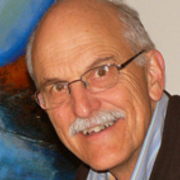
Kim Gabara
Kim Gabara discovered the world of television in his native Canada, while "rattling around in art school". A part time job at Calgary television station CHCT saw him sweeping the studio floor, and becoming caught up in the "excitement and atmosphere" of TV. Gabara trained up in the camera, sound and editing departments, and soon became one of the youngest presentation directors the station had seen.
In 1968 Gabara met Kiwi Joan Walker, and the couple returned to New Zealand to marry. Gabara started work soon after at the NZ Broadcasting Corporation in Christchurch. Gabara worked on a variety of shows, including directing for popular magazine show Town and Around. Work in television provided "a wonderful introduction to New Zealand places, people, history and culture that I'm sure I'd never have achieved in a 'normal' workplace".
Gabara spent the majority of his producing career making children's programmes, from Kiwi staples Play School and Spot On, to fictional tales of his own invention. "The goal," he says, "was to make programmes for New Zealand children that reflected New Zealand and told 'our' stories and practices. The children's area was under less scrutiny than mainstream prime-time programming, but that only meant that we had the opportunity to do more, and try things that wouldn't be considered or allowed in other 'adult' time slots. In short it was fun - and I was paid to do it!"
Among the shows that Gabara created, produced and directed was Pumbleduffs — plus two shows (Woolly Manor, Woolly Tales) for younger viewers which gave early notice of the many talents of future Count Homogenized Russell Smith, Annie Whittle and future After School presenter Olly Ohlson. But it is the final show in the Woolly trio that is best-remembered today: long-running puppet series Woolly Valley, the tale of a farming couple and their talking sheep.
Outside of television, Garbara acted in Christchurch comedy group Merely Players. Whittle recalls one sketch where his character suddenly flew across the stage on a rope, with a rose in his mouth.
In 1980 Gabara did a stint as Head of Children's Programmes, but quickly resigned after discovering he didn't enjoy the administrative overview of "other people doing what I really wanted to be doing". Gabara returned to creating, producing and directing TV programmes.
A vampire with a thirst for milk would become Gabara's most enduring creation. Played by Russell Smith in white make-up, fangs and cape, Count Homogenized made his first appearance over two seasons of late 70s series A Haunting We Will Go. Gabara decided that a Dracula-style character would work well on the show, but felt a liking for healthy milk would work much better for a children's audience than the traditional blood. Homogenized later won his own self-titled show, and a stake in many Kiwi's hearts.
Gabara also worked on quirky Peter Hawes question and answer programme Yours for the Asking, provided Māori language inserts for Sesame Street, and directed adventure series The Kids from Owl, which not only featured a crime-fighting duo of Kiwi teens, but made early use of graphics from an Apple computer. He also worked on Tales of the Mist, whose otherworldy tales were inspired by folk stories by Anthony Holcroft. For many years Gabara was Christchurch producer of Telethon, and was also involved in director training and mentoring junior producers and directors.
In 1990, with production at TVNZ Christchurch winding down, Gabara was seconded to the Christchurch Polytechnic Broadcasting School as tutor of TV Production. By 1992 the secondment had became a full-time job.
Three years later Gabara decided to pursue semi-retirement. He spent the next 13 years with the broadcasting school as Internship Manager - supervising senior students completing their studies on-the-job in TV, radio and broadcast journalism around New Zealand. "Once again I was given the chance to explore and enjoy cities and towns around the country - often catching up with old colleagues. It felt like I was coming full circle."
Full retirement arrived in 1998: "a chance to really complete the circle, by pursuing my artwork aspirations full time"..
Profile updated on 6 February 2020
Sources include
Kim Gabara
Russell Smith
'Annie Whittle - Funny As Interview' (Video Interview) NZ On Screen website. Director Rupert Mackenzie. Loaded 19 August 2019. Accessed 6 February 2020